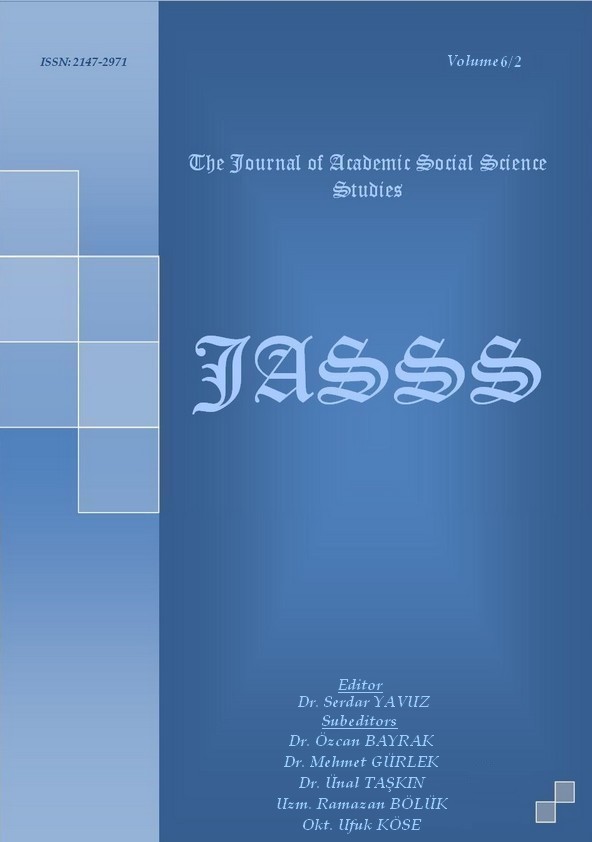Author :
Abstract
Sigmund Freud’un temellerini attığı psikanaliz, edebiyat eleştirisinde sıkça kullanılan bir yöntemdir. Psikanalitik eleştirinin ilk örneğini veren Freud, yazarın metinde ortaya koyduğu psikolojik semptomları incelerken yazarı nevrotik biri olarak değerlendirir. Ona göre bastırılmış dürtüler yazarı yazmaya itmekte ve yazar yaratma eylemi sayesinde baskıdan kurtulmaktadır. Yaratmanın kaynağını bulmaya çalışan bu yöntemde, metinde yazarın bilinçaltının tespit edilebileceği iddia edilir ve sanatın neden doğduğu, sanatçının neden yarattığı sorularına cevaplar aranır. Psikanalitik eleştiri, yazarı merkeze alan bir yöntem olması yanında eserdeki kişilere, eserin biçim ve içeriğine yönelik çözümlemelere de imkân tanımaktadır. Bu yazıda Halide Edib Adıvar’ın (1882-1964) Handan (1912) adlı romanı psikanalitik eleştiri kuramına göre incelenmiştir. Romanın başkişisi Handan ile yazar arasında çok açık benzerlikler bulunmaktadır. Roman otobiyografik özellikler taşıdığından yazarın bir kadın olarak kendini yazma, kadın psikolojisini ve aşk duygusunu işleme şekli önem kazanmaktadır. Romanda idealleştirilmiş modern kadının etrafında gelişen üç aşk üçgeni vardır: Nâzım-Handan-Hüsnü Paşa üçgeninde cinselliğin ideolojiden üstün tutulması, Handan-Refik Cemal-Neriman üçgeninde geleneksel kadına karşı modern kadının arzulanması ve Hüsnü Paşa-Handan-Refik Cemal üçgeninde yaşanan ihanetler sonunda modern kadının yeni bir aşka düşmesi söz konusudur. İdealleştirilen modern kadın arzu nesnesiyle cinsel ve düşünsel alanda tam bir kaynaşma hali yaşamak, arzuladığı birlikteliğe bütün mevcudiyetiyle teslim olmak ister. Karşılıklı aşkı bulduğu anda ise yazar onu ölümle cezalandırır. Böyle bir sona varılması yazarın dönemin toplumsal koşullarına uymayı tercih etmesiyle ilintili olsa da aşk ilişkisi ve kadın psikolojisinin anlatımı göz önüne alındığında roman türünün iyi bir aşama kaydettiği anlaşılmaktadır.
Keywords
Abstract
Psychoanalysis which was based by Sigmund Freud is a frequently used method in literary criticism. Having presented the first example of psychoanalytic criticism, Freud saw the author as a neurotic person while he analyzed the psychological symptoms put forward in the text by the same author. In his opinion, suppressed instincts lead the author to write and the author is freed from the pressure due to the action of creation. This method which tries to find the source of creating claims that the subconscious of the author is indicated in the text. Furthermore, answers are sought to the questions as to why art came into existence and why the artist keeps creating. Besides being a method that places the author in the center, psychoanalytic criticism enables analyses oriented towards the characters, style, and content of the work. In this text, Halide Edib Adıvar’s (1882-1964) novel titled as Handan (1912) has been analyzed on the basis of psychoanalytic criticism theory. There are explicit similarities between the author and the protagonist of the novel, Handan. As the novel has autobiographic characteristics, the author’s writing of herself as a woman and her weaving of female psychology and love as an emotion gains importance. In the novel there are three love triangles developing around the idealized modern woman: In the Nâzım-Handan-Hüsnü Paşa triangle, sexuality is valued above ideology; in the Handan-Refik Cemal-Neriman triangle modern woman is preferred to traditional woman; and in the Hüsnü Paşa-Handan-Refik Cemal triangle, the modern woman finds a new love after the betrayals. The idealized modern woman wants to experience an absolute coalescence with the object of desire on the sexual and mental surfaces and to surrender to the relationship she has desired with all her existence. The moment she finds mutual love, she is punished with death by author. Although an end like this is related to the preference of the author to obey the social conditions of the period, when love affair and the expression of female psychology is taken into consideration, it can be indicated that novel as a genre has been developed in a positive manner.





